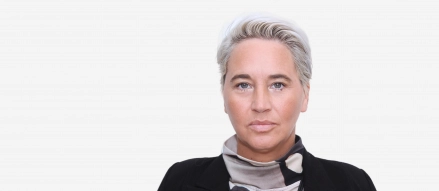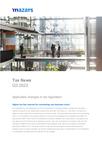
Tax News - September 2022
Applicable changes in tax legislation
Higher tax-free amount for commuting and business travel
An amendment to the Regulation on the tax treatment of reimbursements of expenses and other income arising from the employment relationship will enter into force on 1 July 2022. It concerns a higher tax-free amount for commuting and business travel. The new maximum amount for commuting which is not included in the taxable amount of income from employment will therefore be EUR 0.21 (previously EUR 0.18) for each full kilometre of distance between the normal place of residence and the place of work for each day of presence at work. The cost of transport on business trips will also increase to EUR 0.43 for each full kilometre if the employee uses his/her own means of transport (previously EUR 0.37). It should be borne in mind that the tax aspect of the reimbursement of transport costs is being changed, but not the employment law aspect, and therefore not all employers or employees will necessarily be affected by the change.
Raising the limit for tax-free meal allowance
In the light of rising food prices, the government issued an amended regulation on 30 August 2022, increasing the tax-free amount of reimbursement of meal allowance from the current EUR 6.12 to EUR 7.96 per day if the employee is present at work for at least four hours a day. However, when an employee works for ten hours or more, the amount up to which the reimbursement of meal expenses during work is not included in the taxable amount of employment income increases from EUR 0.76 to EUR 0.99 for each additional hour of presence at work after eight hours of presence at work.
The amended Regulation will apply to reimbursements from September 2022.
Ministry of Finance: proposals to amend four tax laws
On 1 August, the Ministry of Finance (MoF) submitted proposals for amendments to four tax laws for public publication on the E-democracy portal and for inter-ministerial discussion. The amendments pursue several objectives: they abolish or correct certain measures adopted in 2021 and 2022, in particular to ensure fiscal stability; they address certain topics from the Coalition's Work Program 2022-2026 and the drags; they bring administrative simplification for taxpayers; and they transpose EU directives into the Slovenian legal order. As regards the proposed amendments to the Income Tax Act, the changes are as follows:
- The amount of the general deduction is set at EUR 5,000 and the gradual increase to EUR 7,500 is abolished.
- The total income up to which a resident is entitled to an additional general deduction in addition to the general deduction is increased from EUR 13,716.33 to EUR 15,000.
- Youth allowance: a reduction of the taxable amount of income from employment of EUR 1,000 per tax year for taxable persons up to the age of 26 or of EUR 500 for taxable persons after the age of 26 up to the age of 29 is introduced.
- Taxation in the highest tax bracket: the tax rate in the last, 5th income tax bracket is increased from the current 45% to 50%.
- Indexation: the mechanism of automatic reconciliation of the amounts of reliefs and the net annual tax bases is abolished and a modified reconciliation mechanism is introduced.
- Business performance: an additional condition for favourable tax treatment is introduced for the payment for business performance (payment no more than twice in a calendar year) and the possibility of favourable tax treatment of income from this purpose amounting to 100% of the average monthly salary of employees in Slovenia is abolished.
- Condition for entry/existence in the normalized expenditure scheme: the condition for entry/existence in the normalized expenditure scheme for income from an activity linked to compulsory pension and invalidity insurance of the taxable person or of a person employed by the taxable person is clarified and the period of continuous participation in the insurance is extended (to nine months);
- Rental: the income tax rate on rental income is set at 25% and the amount of the normal costs recognized remains unchanged.
- Income from capital: for income from capital, the taxation as dividends of the value of shares paid out in the event of disposal of shares in the context of the acquisition of the company's own shares (except where the company acquires its own shares on a regulated market) is reintroduced, thus ensuring a comparable definition of income (dividends) to that under the Corporation Tax Act and the same treatment of such income for individuals with comparable incomes. o Income from capital: the taxation of income from capital is also reintroduced.
In addition to the amendment to the Income Tax Act, the amendments also include proposals for amendments to the Excise Duty Act, the Tax Procedure Act and the Financial Administration Act.
The proposed amendment to the Excise Duty Act aims to mitigate the impact of high energy prices on the agricultural and forestry sectors. The proposal therefore provides, among other things, that the right to a refund of excise duty on agricultural and forestry machinery will be replaced, as of 1 January 2023, by the right to purchase tax-labelled agricultural fuel with a direct exemption from (part of) the excise duty. From 1 January to 31 May 2023, the excise duty liability on the purchase of agricultural fuel will thus be reduced from 30% to 0%. From 1 June 2023, the excise duty liability on agricultural fuel will be 30%.
Amendment of Article 31 of the Corporate Income Tax Act (ZDDPO-2)
As of 18 August 2022 (Official Gazette of the Republic of Slovenia, No 105-2603/2022), an amendment to Article 31 of the Corporate Income Tax Act (ZDDPO-2) entered into force, which provides that:
- entertainment expenses and
- expenses of the supervisory board or other body which performs only a supervisory function, shall be recognized as expenses in the amount of:
- 60% for tax periods beginning up to 31.12.2022.
- 50% for tax periods beginning on or after 1.1.2023.
Law on an emergency measure in the field of value added tax to mitigate the increase in energy prices
The government has decided to reduce value added tax (VAT) on energy products for all users, both household and business consumers. The reduced rate will now be 9.5% (previously 22%) and will apply for the heating season, from 1 September to 31 May next year.
The aim of the reduction was to mitigate the increase in energy prices. It is being sent to the National Assembly for urgent consideration and adoption. The government proposes to reduce VAT on the supply of electricity, natural gas, firewood, and district heating. However, it does not yet apply to heating oil. As a result, the state coffers will receive around EUR 130 million less in the coming heating season. The impact on households is expected to be between a few hundred euros and more than a thousand euros over the course of the heating season.
Amendment of the Fire Duties Regulation
On 10 May 2022, the Government of the Republic of Slovenia adopted an amendment to the Fire Duties Regulation. Specifically, Article 5 of the Regulation is amended, increasing the fire tax from the current 5% to 9% of the fire tax base.
The fire tax is payable on the insurance premium paid by the policyholder to the insurer on the basis of the fire risk insurance contract. The amendment shall enter into force on 1 October 2022.
Use of e-invoice for paying corporation tax, income tax and business income tax
From 6 June 2022, the simplification of the payment of compulsory levies will include the obligations calculated by means of the corporate income tax return (hereinafter referred to as "CITR") and the return of income tax and business income tax (hereinafter referred to as "BIT"). The taxable person must apply for receipt of an e-invoice to the Owl's online bank, whereby the receipt of an application for receipt of an e-invoice constitutes the taxable person's acceptance of the "General conditions for the payment of compulsory levies by means of an e-invoice". This is done only once by the taxable person, as the opt-in is valid until cancellation or closure of the account. If the taxable person already receives an e-invoice for the payment of compulsory levies, no new registration is necessary. Based on the submitted VAT return or tax return, FURS will prepare a payment order notification for the taxable person, which will contain the information for the payment of the liability. This notification will be sent to the debtor via his bank in the form of an e-bill in the single standardized eSlog format. In order to extract the payment order, the debtor will have to validate the payment order in the online bank, which is prepared in accordance with the e-invoice sent.
Tax Authority: Postponement of the deadline for the implementation of the new REK-O form
The Official Gazette of the Republic of Slovenia No 96/2022 of 15 July 2022 published the Regulation on amendments to the Regulation on the content and form of the withholding tax return, which sets a new deadline for the implementation of the new REK-O form for payments from 1 January 2023 onwards.
Employment subsidy for green jobs
Employers can receive a subsidy of €680 per month for employing unemployed people in green jobs on a permanent basis. The duration of the subsidy is 12 months. The subsidy is available to employers in green industries or employers who employ workers in the ''green'' professions:
- Employers in activities such as the forest-wood chain, organic farming, efficient use of natural resources, renewable energy production, energy efficiency, sustainable tourism or other activities that contribute to climate change objectives,
- Employers who employ workers in occupations such as carpentry, forestry, assembly, engineering, repair, environmental or similar occupations with environmental recognition.
The call is open until the funds are exhausted, but no later than 30.6.2024.

